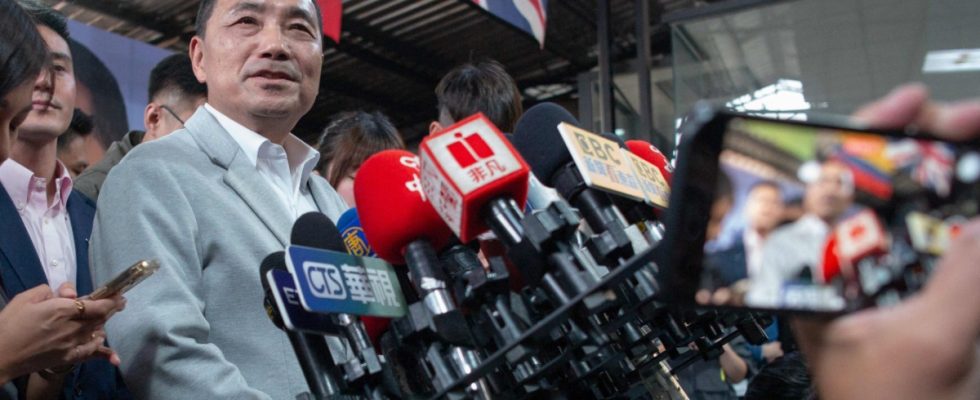Taiwan is still a young democracy and lives in the shadow of the threat from its neighbor China. China’s strongman Xi Jinping just informed US President Joe Biden when the two met in San Francisco that his People’s Republic of China would one day annex Taiwan, which would be “unstoppable.” Elections in Taiwan can therefore feel more fateful than elsewhere, for the country itself but also for the international community, primarily the Taiwan ally USA.
On January 13, Taiwan will elect a new president and parliament, and again it will be “a critical election,” says Wu Jieh-min, a researcher at Academia Sinica in Taipei. “We have critical elections every four years, and none are easier than the last: we still experience enormous pressure from China, and we still fight every day for solidarity within our society.”
This is good news for Xi Jinping and China’s Communist Party
When the two leading opposition candidates announced this week that they wanted to run as a team in the elections, the news made waves: the new alliance – if it holds – has what it takes, the previous poll results, to support the ruling Democratic Progressive Party in the presidential election (DPP) see in front, to turn it on its head. However, a victory for the opposition alliance, whose partners want to be more accommodating to Beijing, would be good news for Xi Jinping and China’s Communist Party. The consequences would probably be at least a temporary relaxation in the relationship, but possibly also more influence from China on Taiwan, which the ruling DPP warns against in the strongest terms.
There are two very unequal partners who want to join forces: On the one hand, the more than 100-year-old Kuomintang (KMT), which lost the civil war against Mao Zedong’s communists on the mainland in 1949 and then disbanded the remnants of their “Republic of China”. Taiwan defended – in the first decades as a nationalist one-party dictatorship. On the other hand, the young Taiwan People’s Party (TPP), which is just four years old.
The populist Ko Wen-je is well received by young men
Above all, the figureheads of the two parties could hardly be more different. The KMT man Hou Yu-ih, a former police officer and later mayor of New Taipei, appears rather pale. TPP founder Ko Wen-je, on the other hand, a former star surgeon and mayor of Taipei, pulls out all the stops of populism and is particularly well received by young men.
In the polls, TPP leader Ko was most recently ahead of KMT man Hou with 22 percent with 24 percent, but both were lagging behind the candidate of the ruling party DPP, William Lai. He is currently Vice President of Taiwan. Various surveys saw him between 30 and 38 percent, and recently his numbers fell slightly.
But Taiwan has no runoff elections. Whoever is ahead in the first round of voting wins. So far, DPP candidate Lai has benefited from the division in the opposition, especially since a third opposition member had thrown his hat into the ring: the extremely wealthy entrepreneur Terry Gou, head of the Foxconn Group, which operates in China and which, among other things, produces almost all iPhones. Gou has no chance, but in surveys he attracts another eight percent of opposition voters.
When old disgust evaporates in the face of power
It is no secret that Beijing wanted the opposition to unite against the ruling DPP, which has its roots in the fight against the KMT dictatorship and in the independence movement. China’s Communist Party officials regularly insult William Lai with insults such as “independence liar.” The KMT, on the other hand, has long been promising to resume the broken thread of talks between Beijing and Taipei.
The KMT is committed to the “1992 Consensus” that it once negotiated, a vague agreement according to which both sides admit that there is only one China, without defining what exactly this one China should look like. Populist Ko Wen-je, in turn, said Taiwan and China are part of “one family” and promises “deterrence and communication” at the same time. Despite their longing for relaxation, it is clear to all candidates that Taiwan’s voters have no desire whatsoever to merge into Xi Jinping’s empire.
How resilient the new alliance is will become apparent for the first time on Saturday morning: Then it will be clear which of the two parties will nominate the presidential candidate. Survey results from the last ten days should be used to make the decision. Details of the process are unclear; some commentators see the KMT man at an advantage and think that TPP leader Ko allowed himself to be “overrun” in the negotiations.
It is also unclear whether Ko’s supporters will go along with the change. The former doctor Ko ran as an anti-establishment candidate and, shortly after agreeing to an alliance with the KMT, had to be told of one of his old quotes, according to which he hated “nothing in life” as much as “mosquitoes, cockroaches and the Kuomintang “. Why is he now working together with this KMT of all people? Ko’s explanation: He hates the ruling DPP “even more.”

